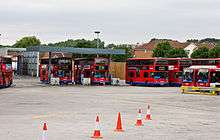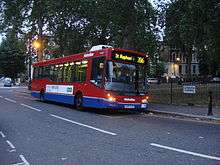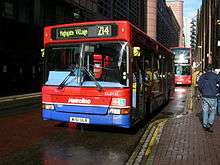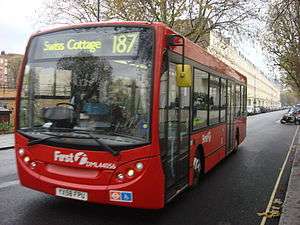Metroline
|
| |
|
| |
| Parent | ComfortDelGro |
|---|---|
| Founded | 1 April 1989 |
| Headquarters | Cricklewood |
| Service area | Greater London, Hertfordshire |
| Service type | Bus services |
| Routes | 106 (May 2015) |
| Depots | 14 |
| Fleet | 1,606 (May 2015) |
| Fuel type | Diesel and hybrid |
| Website | www.metroline.co.uk |
Metroline is a bus company operating services in Greater London. It is a subsidiary of ComfortDelGro and operates services under contract to Transport for London. Operations are split between two registered companies, Metroline Travel Limited and Metroline West Limited.

%2C_route_24%2C_22_June_2013.jpg)

%2C_2006_Alexander_Dennis_Enviro_400_integral%2C_route_24%2C_Westminster_tube_station%2C_13_May_2006.jpg)







Company history
On 1 April 1989, London Buses was divided into 11 separate business units, one of which was Metroline.[1] As part of the privatisation of London bus services, Metroline was sold in October 1994 to a management buyout. In July 1998, it purchased MTL London and in March 2000 was sold to DelGro Corporation.[2] In August 2004 ComfortDelGro purchased Thorpes[3] and in November 2004 Armchair Passenger Transport[4] with seven routes and 86 buses. Initially both retained their existing names before being rebranded in January 2007.[2]
When privatised, Metroline adopted a livery of red with a dark blue skirt. This was briefly changed to light blue in the mid 2000s before the dark blue was reinstated. In June 2009, Metroline adopted an all red scheme to comply with Transport for London requirements. In 2014, a blue, white and red livery was introduced on buses dedicated to non Transport for London services.[5]
On 22 June 2013, Metroline purchased First London's Alperton, Greenford, Hayes, Uxbridge and Willesden Junction depots with 494 buses.[6]
Metroline Travel
Metroline Travel Limited[7] operates nine bus garages.
Brentford (AH)
As of May 2015, Brentford garage operate routes 190, 209, 237, E2 and E8.[8]
History
Brentford was opened in 1990 by Armchair Passenger Transport, initially to house buses for its recently won route 260. It had previously been used as a base for coach operations, at the time Armchair's main business. In November 2004 Armchair was bought out by Metroline's parent ComfortDelgro, although it continued to operate buses separately under the Armchair name until 2007.
Armchair's coach business continues to operate under its own name, and includes commuter coach services and private hire.
Cricklewood (W)
As of May 2015, Cricklewood garage operated routes 16, 32, 112, 139, 143, 168, 189, 210, 232, 316, 324, 332, 632, 643, C11 and N16.[9]
History
This garage opened for in May 1905 and was originally called Dollis Hill. It was the first motorised depot used by the London General Omnibus Company and is one of London's oldest bus garages. In 2007 bus parking was temporarily relocated to a site on the opposite side of Edgware Road to allow work to start on the replacement of the original buildings with a modern structure. In January 2009, bus parking transferred back to the main site.
Edgware (EW)
As of May 2015, Edgware garage operated routes 107, 113, 186, 204 and 240, 606, N5, N98 and N113.[10]
History
When Edgware garage was first opened by the London General Omnibus Company in 1925 it had space for 24 buses, but there was plenty of room adjacent to the then recently built underground station. In 1939 a new building was erected next to the original one, which was to become the new bus station, while the remaining open parking area was used to store vehicles for the trolleybus replacement programme. In 1984 a new 100-bus garage was built on old railway land at a cost of £4.5 million. However, in 1992 Edgware garage was earmarked for closure, as Cricklewood garage was to become a fully functioning garage with new facilities. The outdoor parking area and the bus station then became a midibus base in 1993, with a new bus wash and light maintenance facilities provided in the yard. In 1999 London Sovereign, which had won some recent tenders in the North East London area, took on a 10-year lease on half of Edgware garage and invested in new maintenance facilities to replace its former base at Borehamwood. In late 2000 Metroline moved back into the other half of the garage, making it one of the few garages to be shared by two operators.
Harrow Weald (HD)
As of May 2015, Harrow Weald garage operated routes 140, 182, 640, H12 and N16.[11]
History
Harrow Weald garage was opened in 1930 by the London General Omnibus Company to replace the much smaller South Harrow garage. The new garage had to be extended over the forecourt just two years later to provide additional space. In its earlier years the garage was used by experimental vehicles including the Daimler CH6s and the first diesel bus (ST). In 1987 Harrow Weald was the base for the new Harrow Buses operation set up by London Transport which had won tenders for a new local network. The garage survived the collapse of Harrow Buses and passed to Metroline, and in 1994 just short of 60 buses were based there. The garage also carries out engineering work on buses based at Edgware garage.
Holloway (HT)
As of May 2015, Holloway garage operated routes 4, 17, 24, 43, 91, 134, 271, 390, 603 N5, N20, N91, N113 and W7.[11]
History
Originally opened as Holloway Tram Depot in 1907, it was the largest of the London County Council's sheds, with space for 336 trams. It was renamed Highgate in 1950 (by which time it was a trolleybus depot) to avoid confusion with Holloway (J) Bus Garage, and then back to Holloway in 1971 following the closure of the original Holloway garage. The garage then had an allocation of 210 buses, although that drifted downwards until 1993, when the closure of Chalk Farm and the transfer of five routes into the garage meant Holloway was once again full. Today the garage is almost at capacity levels, with around 200 buses allocated in addition to the outstation at Kings Cross.
King's Cross (KC)
As of May 2015, King's Cross garage operates routes 46, 214 and 274.[11]
History
On 10 July 2010, this garage in Freight Lane opened to replace King's Cross (KX) garage in York Lane.
Perivale West (PA)
As of May 2015, Perivale West garage operated routes 7, 79, 90, 105, 297, 395, 611, E6 and N7.[12]
Potters Bar (PB)
As of May 2015, Potters Bar garage operated London routes 34, 82, 125, 217, 234, 263, 307, 384, 634, N20, N91, W8 and W9.[12] It also operates Hertfordshire County Council routes 84, 84A, 84B, 242, 714, and PB1.
History
Opened in 1930 at a cost of over £48,000 by the London General Omnibus Company subsidiary 'Overground', it was nearly closed in the 1960s as it was too far north to be useful to the London bus network. It survived but soon faced closure again in the 1980s during deregulation. This time it was saved after crews accepted a revised pay agreement and the depot tendered for and won Hertfordshire County Council routes. During the Second World War and in the run-up to the Festival of Britain, the garage was used as a storage facility for buses. In 1952 the garage allocation consisted entirely of AEC Regent III RTs, with some 68 as a daily requirement. In 1973 the experimental FRM1 was allocated to the garage for single bus route 284 and lasted there until 1976. The garage has seen a mix of buses over the years, ranging from Ford minibuses and A class Dodges to Volvo Ailsas and the route-branded X43 Scanias transferred when Finchley garage closed. It is the only depot to run non-TFL routes
Willesden (AC)
As of May 2015, Willesden garage operated routes 6, 52, 98, 260, 302, 460 and N98.[8]
History
Opened in 1902, Willesden was used for major chassis overhauls before Chiswick Works opened in 1921. During World War II it was also used to provide major body overhauls. Prior to the war its allocation consisted mainly of STs and STLs whilst RTs and RTWs were the main allocation afterwards. Prototype AEC Routemaster RML3 was allocated to the garage in 1958, and then ran the first production Routemasters on route 8 in 1959. These moved on for trolleybus replacement later that year but Routemasters reappeared in 1965 to replace the RTWs. Improvements to the garage were made in 1975 to enlarge its capacity from 90 to 120 in order for the Stonebridge allocation to be moved in, although the talk of providing staff housing on the site never materialised and Stonebridge work did not move to Willesden, but to Westbourne Park. In 1994 Metroline became the first ex London Buses company to expand when it bought Atlas Bus & Coach, regaining route 52 which it had earlier lost under tendering although it continued to be operated from Harlesden until 1995.
On 11 December 2010, route 460 was transferred to this garage.
Metroline West
Metroline West Limited[13] operates five bus garages purchased from First London in June 2013.
Alperton (ON)
As of May 2015, Alperton garage operated routes 83, 223, 224, 245 and 487.[12]
History
One of three garages built by the London Passenger Transport Board, and the only one to survive, Alperton Garage opened in June 1939, adjacent to the Piccadilly line tube station of the same name.
When it opened it had an allocation entirely of STLs which were reshuffled from Cricklewood, Hanwell, Harrow Weald and Willesden garages. As Alperton was a new garage and had plenty of headroom it was one of the few garages able to take utility Guy Arabs, and at one stage these made up its complete allocation and lasted until 1954 when they were replaced by STLs.
By 1972 with the arrival of numerous AEC Merlin and AEC Swift class single deck buses to operate the numerous one man operated services, and the further allocation of Daimler Fleetlines, parking space was becoming a problem. It therefore became necessary to park a dozen or so buses on nearby Glacier Metals' car park overnight. The garage was consequently enlarged between 1976–78, which encompassed the adjacent former Underground substation, and the LT Lifts and Escalators department which had to move out to new premises. During the reconstruction works, 18 vehicles were outstationed at Stonebridge (SE).
The last AEC Regent III RT buses were transferred out in 1975, and until the beginning of the 1980s, Alperton had an entirely AEC Routemaster and Daimler Fleetline allocation. The first MCW Metrobuses arrived in 1981, and gradually replaced the Daimler Fleetlines on all the one man operated routes, and would become the mainstay of the fleet for many years.
Following the September 1982 service reductions, all the remaining Routemasters were transferred to other garages, route 83 and 187 being one manned at the same time. Replacement Metrobuses were allocated to make up the allocation (mainly used vehicles from Edgware (EW), Hanwell (HL), and Fulwell (FW), making the garage all Metrobus.
By 1995, Alperton was doing most of the maintenance for the CentreWest operation and had also become the home of the training fleet.
Greenford (G)
As of May 2015, Greenford garage operated routes 92, 95, 282, 482, E5, E7 and E9.[11]
History
Greenford bus depot is part of a local council depot and was first used in 1993 as a midibus base. The opening of Greenford garage led to the closure of Hanwell, and in 1995 the garage was operating 110 midibuses. The standard fare of vehicles in the late 1990s were Wright bodied Renault midibuses, and Marshall minibuses but both types had a bad reputation and did not last long.
From late 2003 until 14 March 2009 Ealing Community Transport operated route 195 from the Greenford depot using garage code EY.
Hayes (HS)
As of May 2015, Hayes garage operated routes 195, 207, 427 and N207.[11]
Uxbridge (UX)
As of May 2015, Uxbridge garage operated routes 331, 607, A10, U1, U2, U3, U4, U5 and U10.[9]
History
The original Uxbridge garage was around half a mile out of town on the Oxford Road and was built by the London General Omnibus Company in 1921, but passed to Thames Valley a year later before reverting in 1929 to work its new local routes which were operated mainly by single deckers. An extension was added in the late 1940s and a new garage was planned, although work didn't begin until the 1980s.
The new garage opened in late 1983 next to the underground station occupying the lower ground floor of a multi use building. In 1989 the garage began operating the U-Line network of local routes using 16 seater Alexander bodied Mercedes-Benz midibuses (MAs) in an initiative by London Transport. The growth of use of the U-Line services over the years since 1989 has meant that larger buses have been put into service on these routes. The garage also operated the busy 207. In 1994, the garage was allocated some of London's first low-floor single deckers, Wright bodied Dennis Lance SLFs with Centrewest branding for the then operated route 222.
Willesden Junction (WJ)
As of October 2015, Willesden Junction garage operated routes 18, 187, 206, 226, 228 , 295 and N18.[9]
Former Garages
North Wembley (NW)
History
North Wembley was opened as a midibus base in 1994, and in latter years buses have been gradually been getting longer, although still single deck. North Wembley had no maintenance facilities, and therefore all maintenance was carried out by Harrow Weald. On 30 May 2009, North Wembley closed.
Perivale East (PV)
History
On 26 November 2011, Metroline commenced operating route 79.[14] On 28 April 2012, route 206 passed to First London.[15] On 23 June 2012, Perivale East closed and route 70 passed to First London.[16]
Fleet
As at May 2015, the fleet consisted of 1,606 buses.[17]
References
- ↑ Companies House extract company no 2328608 Metroline London Northern
- 1 2 History Metroline
- ↑ Companies House extract company no 2544617 FE Thorpe & Sons
- ↑ Companies House extract company no 675672 Armchair Passenger Transport Company Limited
- ↑ "Metroline brings back blue beyond Tfl-land" Buses issue 713 August 2014 page 21
- ↑ FirstGroup Announces Sale of Eight London Bus Depots FirstGroup 10 April 2013
- ↑ Companies House extract company no 2328401 Metroline Travel Limited
- 1 2 Carr, Ken (May 2015). The London Bus Guide (5 ed.). Boreham: Visions International Entertainment. p. 112. ISBN 978-0-9931735-3-0.
- 1 2 3 Carr, Ken (May 2015). The London Bus Guide (5 ed.). Boreham: Visions International Entertainment. p. 120. ISBN 978-0-9931735-3-0.
- ↑ Carr, Ken (May 2015). The London Bus Guide (5 ed.). Boreham: Visions International Entertainment. p. 115. ISBN 978-0-9931735-3-0.
- 1 2 3 4 5 Carr, Ken (May 2015). The London Bus Guide (5 ed.). Boreham: Visions International Entertainment. p. 116. ISBN 978-0-9931735-3-0.
- 1 2 3 Carr, Ken (May 2015). The London Bus Guide (5 ed.). Boreham: Visions International Entertainment. p. 117. ISBN 978-0-9931735-3-0.
- ↑ Companies House extract company no 8401654 Metroline West Limited
- ↑ Bus tender results Route 70 Transport for London 08 April 2011
- ↑ Bus tender results Route 206 Transport for London 18 August 2011
- ↑ Bus tender results Route 70 Transport for London 15 September 2011
- ↑ Carr, Ken (May 2015). The London Bus Guide (5 ed.). Boreham: Visions International Entertainment. p. 34. ISBN 978-0-9931735-3-0.
External links
 Media related to Metroline at Wikimedia Commons
Media related to Metroline at Wikimedia Commons- Official website
| ||||||||||||||
| ||||||||||||||||||||||||||||||||||||||||||||
%2C_23_June_2012.jpg)
